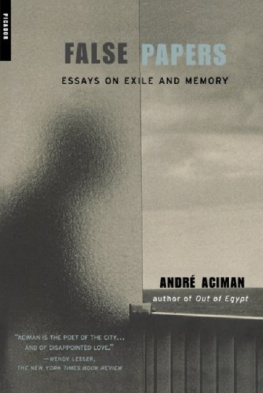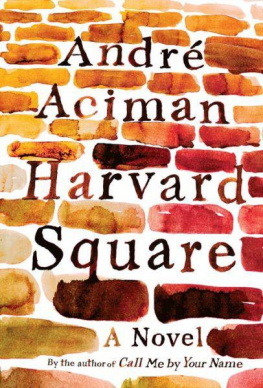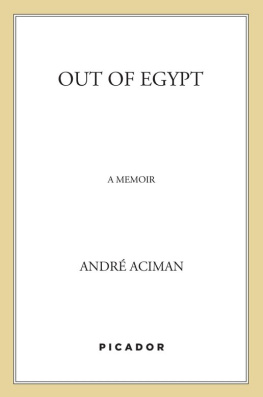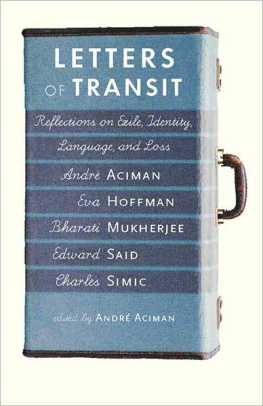André Aciman - Homo Irrealis
Here you can read online André Aciman - Homo Irrealis full text of the book (entire story) in english for free. Download pdf and epub, get meaning, cover and reviews about this ebook. publisher: Farrar, Straus and Giroux, genre: Art. Description of the work, (preface) as well as reviews are available. Best literature library LitArk.com created for fans of good reading and offers a wide selection of genres:
Romance novel
Science fiction
Adventure
Detective
Science
History
Home and family
Prose
Art
Politics
Computer
Non-fiction
Religion
Business
Children
Humor
Choose a favorite category and find really read worthwhile books. Enjoy immersion in the world of imagination, feel the emotions of the characters or learn something new for yourself, make an fascinating discovery.

- Book:Homo Irrealis
- Author:
- Publisher:Farrar, Straus and Giroux
- Genre:
- Rating:4 / 5
- Favourites:Add to favourites
- Your mark:
- 80
- 1
- 2
- 3
- 4
- 5
Homo Irrealis: summary, description and annotation
We offer to read an annotation, description, summary or preface (depends on what the author of the book "Homo Irrealis" wrote himself). If you haven't found the necessary information about the book — write in the comments, we will try to find it.
Homo Irrealis — read online for free the complete book (whole text) full work
Below is the text of the book, divided by pages. System saving the place of the last page read, allows you to conveniently read the book "Homo Irrealis" online for free, without having to search again every time where you left off. Put a bookmark, and you can go to the page where you finished reading at any time.
Font size:
Interval:
Bookmark:
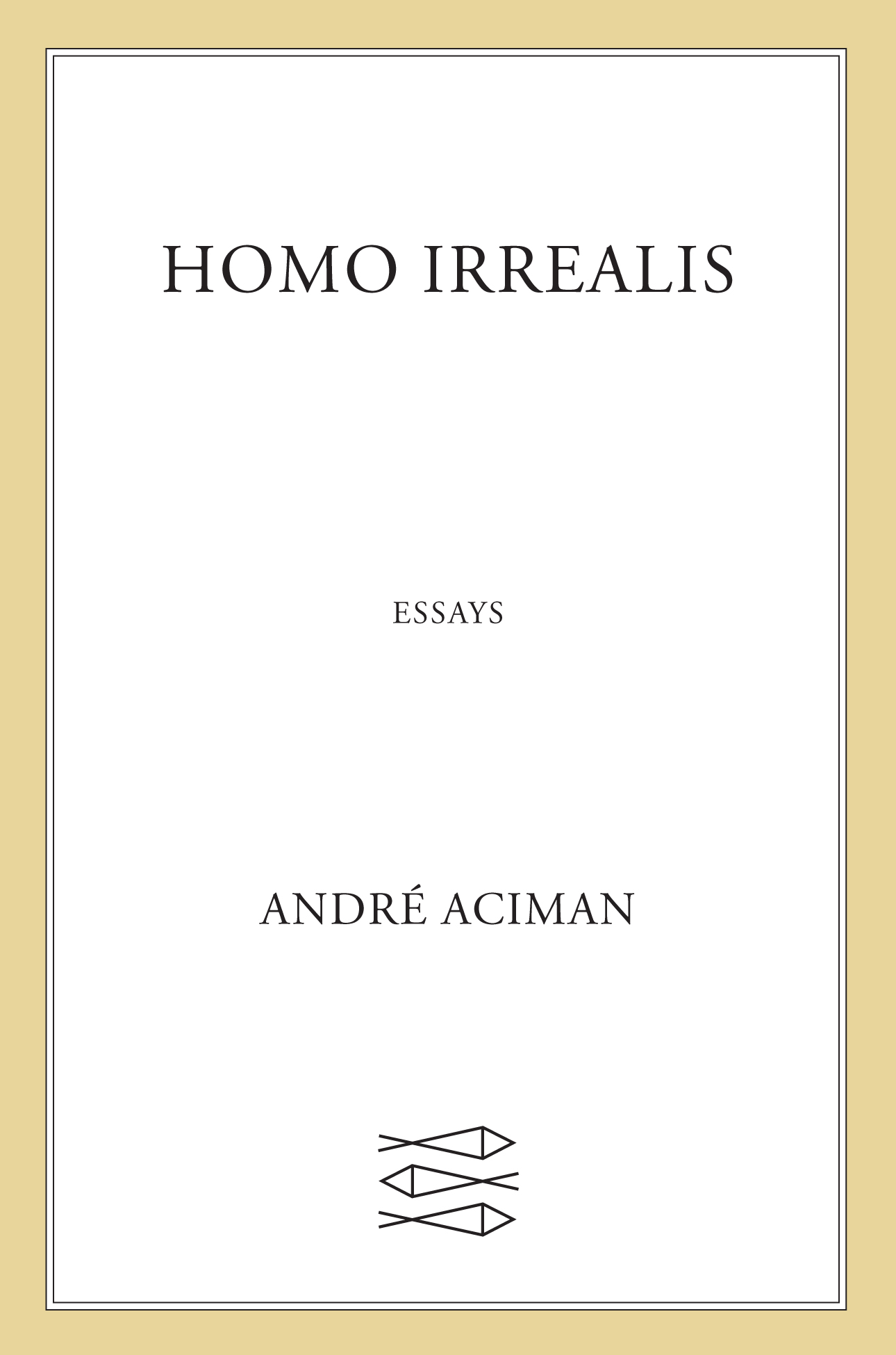


The author and publisher have provided this e-book to you for your personal use only. You may not make this e-book publicly available in any way. Copyright infringement is against the law. If you believe the copy of this e-book you are reading infringes on the authors copyright, please notify the publisher at: us.macmillanusa.com/piracy.
In memory of Robert J. Colannino.
Rest, my dear and dearest friend.
Im the gap between what I am and what I am not.
FERNANDO PESSOA
Irrealis moods are a category of verbal moods that indicate that certain events have not happened, may never happen, or should or must or are indeed desired to happen, but for which there is no indication that they will ever happen. Irrealis moods are also known as counterfactual moods and include the conditional, the subjunctive, the optative, and the imperativeall best expressed in this book as the might-be and the might-have-been.
Four sentences that I wrote years ago keep coming back to me. I am still not certain that I understand these sentences. Part of me wants to nail them down, while another fears that by doing so I will snuff out a meaning that cant be told in wordsor, worse yet, that the very attempt to fathom their meaning might allow it to go into deeper hiding still. Its almost as though these four sentences dont want me, their author, to know what I was trying to say with them. I gave them the words, but their meaning doesnt belong to me.
I wrote them when attempting to understand what lay at the source of that strange strain of nostalgia hovering over almost everything Ive written. Because I was born in Egypt and, like so many Jews living in Egypt, was expelled, at the age of fourteen, it seemed natural that my nostalgia should have roots in Egypt. The trouble is that as an adolescent living in Egypt in what had become an anti-Semitic police state, I grew to hate Egypt and couldnt wait to leave and land in Europe, preferably in France, since my mother tongue was French and our family was strongly attached to what we believed was our French culture. Ironically, however, letters from friends and relatives who had already settled abroad kept reminding those of us who continued to expect to leave Alexandria in the near future that the worst thing about France or Italy or England or Switzerland was that everyone who had left Egypt suffered terrible pangs of nostalgia for their birthplace, which had been their home once but was clearly no longer their homeland. Those of us who still lived in Alexandria expected to be afflicted with nostalgia, and if we spoke about our anticipated nostalgia frequently enough, it was perhaps because evoking this looming nostalgia was our way of immunizing ourselves against it before it sprang on us in Europe. We practiced nostalgia, looking for things and places that would unavoidably remind us of the Alexandria we were about to lose. We were, in a sense, already incubating nostalgia for a place some of us, particularly the young, did not love and couldnt wait to leave behind.
We were behaving like couples who are constantly reminding themselves of their impending divorce so as not to be surprised when indeed it finally does occur and leaves them feeling strangely homesick for a life both know was intolerable.
But because we were also superstitious, practicing nostalgia was, in addition, a devious way of hoping to be granted an unanticipated reprieve from the looming expulsion of all Egyptian Jewry, precisely by pretending we were thoroughly convinced it was fated to happen soon and that indeed we wanted it to happen, even at the price of this nostalgia that was bound to strike us once we were in Europe. Perhaps all of us, young and old, feared Europe and needed at least one more year to get used to our eagerly awaited exodus.
But once in France I soon realized that it was not the friendly and welcoming France I had dreamed of in Egypt. That particular France had been, after all, merely a myth that allowed us to live with the loss of Egypt. Yet, three years later, once I left France and moved to the United States, the old, imagined, dreamed-of France suddenly rose up from its ashes, and nowadays, as an American citizen living in New York, I look back and catch myself longing once more for a France that never existed and couldnt exist but is still out there, somewhere in the transit between Alexandria and Paris and New York, though I cant quite put my finger on its location, because it has no location. It is a fantasy France, and fantasiesanticipated, imagined, or remembereddont necessarily disappear simply because they are unreal. One can, in fact, coddle ones fantasies, though recollected fantasies are no less lodged in the past than are events that truly happened in that past.
The only Alexandria I seemed to care about was the one I believed my father and grandparents had known. It was a sepia-toned city, and it stirred my imagination with memories that couldnt have been mine but that harked back to a time when the city I was losing forever was home to many in my family. I longed for this old Alexandria of two generations before mine, knowing that it had probably never existed the way I pictured it, while the Alexandria that I knew was, well, just real. If only I could travel from our time zone to the other bank and recover this Alexandria that seemed to have existed once.
I was, in more ways than one, already homesick for Alexandria in Alexandria.
Today I dont know if I miss Alexandria at all. I may miss my grandmothers apartment, where everyone in the family spent weeks packing and talking about our eventual move to Rome and then Paris, where most members of the family had already settled. I remember the arrival of suitcases, and more suitcases, and many more suitcases still, all piling up in one of the large living rooms. I remember the smell of leather permeating every room in my grandmothers home while, ironically enough, I was reading A Tale of Two Cities. I miss these days because, with our imminent departure, my parents had taken me out of school, so that I was free to do as I pleased on what seemed like an improvised holiday, while the comings and goings of servants helping with the packing gave our home the air of being set up for a large banquet. I miss these days perhaps because we were no longer quite in Egypt but not in France either. It is the transitional period I missdays when I was already looking ahead to a Europe I was reluctant to admit I feared, all the while not quite able to believe that soon, by Christmas, France would be mine to touch. I miss the late afternoons and early evenings when everyone in the family would materialize for dinner, perhaps because we needed to huddle and draw courage and solidarity together before facing expulsion and exile. These were the days when I was beginning to feel a certain kind of longing that no one had explained to me just yet but that I knew was not so distantly related to sex, which, in my mind, I was confusing with the longing for France.
When I look back to my last months in Alexandria, what I long for is not Alexandria; what I long for when I look back is to revisit that moment when, as an adolescent stuck in Egypt, I dreamed of another life across the Mediterranean and was persuaded its name was France. That moment happened when, on a warm spring day in Alexandria with our windows open, my aunt and I leaned on the sill and stared out at the sea, and she said that the view reminded her of her home in Paris where, if you leaned out a bit from her window, youd catch a view of the Seine. Yes, I was in Alexandria at that moment, but everything about me was already in Paris, staring at a slice of the Seine.
Font size:
Interval:
Bookmark:
Similar books «Homo Irrealis»
Look at similar books to Homo Irrealis. We have selected literature similar in name and meaning in the hope of providing readers with more options to find new, interesting, not yet read works.
Discussion, reviews of the book Homo Irrealis and just readers' own opinions. Leave your comments, write what you think about the work, its meaning or the main characters. Specify what exactly you liked and what you didn't like, and why you think so.

